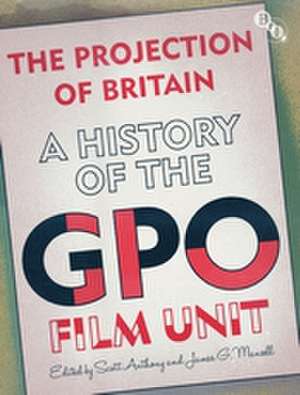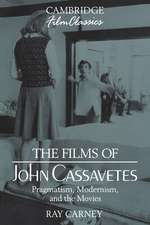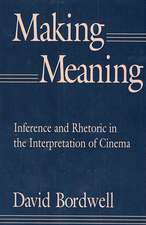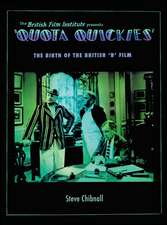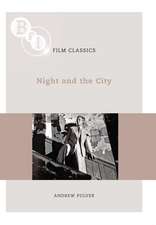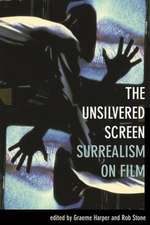The Projection of Britain: A History of the GPO Film Unit
Autor James Mansellen Limba Engleză Paperback – 28 oct 2011
Elements of the GPO Film Unit's story are well known: John Grierson's development of documentary cinema; the influence of Mass Observation and Surrealism on its cinematic vision; the Watt–Auden–Britten collaborationNight Mail.The Projection of Britain: A History of the GPO Film Unitbrings together primary materials and critical appraisals to revisit, re-contextualise and revitalise these seminal moments in British cinema. Here, the insights of an archivist, a musicologist, a design historian, a sports historian, a geographer and a postman – among others – have been edited into a rich critical archaeology of a compelling moment in cinematic history. Interspersed with these essays are primary materials – memoirs, magazine articles, posters and government documents – that detail everything from Alberto Cavalcanti's vision for the documentary movement to a claim for the clothes Humphrey Jennings lost while shooting on location.
In recent years there has been a resurgence of interest in the GPO Film Unit and its work, on the big screen, in DVD boxsets and on the web.The Projection of Britainties together the Unit's diverse artistic, historical and cultural threads into an essential one-stop resource. Provocative, imaginative and ambitious, this expansive study is the definitive companion to an extraordinary episode in cinematic history.
Preț: 262.87 lei
Nou
Puncte Express: 394
Preț estimativ în valută:
50.30€ • 52.66$ • 41.62£
50.30€ • 52.66$ • 41.62£
Carte tipărită la comandă
Livrare economică 05-19 aprilie
Preluare comenzi: 021 569.72.76
Specificații
ISBN-13: 9781844573745
ISBN-10: 1844573745
Pagini: 338
Dimensiuni: 155 x 235 x 28 mm
Greutate: 0.95 kg
Ediția:2011
Editura: British Film Institute
Colecția British Film Institute
Locul publicării:London, United Kingdom
ISBN-10: 1844573745
Pagini: 338
Dimensiuni: 155 x 235 x 28 mm
Greutate: 0.95 kg
Ediția:2011
Editura: British Film Institute
Colecția British Film Institute
Locul publicării:London, United Kingdom
Cuprins
Acknowledgments.-
Foreword
.-
Sir
Christopher
Frayling.-
PART
One:
ARGUMENTS,
IDEAS,
ISSUES
1
John
Grierson
and
the
Lost
World
of
the
GPO
Film
Unit
Jeffrey
Richards.-
2
The
GPO
Film
Unit
and
'Britishness'
in
the
1930s
Scott
Anthony.-
3
GPO
Films
and
Modern
Design
Yasuko
Suga.-
4
Old
Industry,
New
Science?
The
GPO
Film
Unit
between
Palaeotechnology
and
Neotechnology
Timothy
Boon.-
5
An
Archivist's
Perspective
on
the
Work
of
the
GPO
Film
Unit
Steven
Foxon.-
PART
TWO:
FILM-MAKERS
6
Alberto
Cavalcanti:
Lessons
in
Fusion
at
the
GPO
Film
Unit
Charles
Drazin.-
7
Harry
Watt:
on
Land,
at
Sea
and
in
the
Air
Amy
Sargeant.-
8
Humphrey
Jennings:
The
Customs
of
the
Country
Michael
McCluskey.-
9
Portrait
of
an
Invisible
Man:
The
Working
Life
of
Stewart
McAllister,
Film
Editor
Dai
Vaughan.-
10
Job
in
a
Million:
Evelyn
Spice
at
the
GPO
Barbara
Evans.-
11
The
Joy
of
Drooling:
In
Praise
of
Len
Lye
Kevin
Jackson.-
PART
THREE:
KEY
DOCUMENTS
FROM
THE
HISTORY
OF
THE
GPO
FILM
UNIT.-
PART
FOUR:
AESTHETICS.-
12
Rhythm,
Modernity
and
the
Politics
of
Sound;
James
G.
Mansell.-
13
Voiceover/Commentary
Martin
Stollery.-
14
National
Identity,
the
GPO
Film
Unit
and
their
Music
E.
Anna
Claydon.-
15
Technology
the
GPO
Film
Unit
Leo
Enticknap.-
16
Modern
art
and
Design
in
1930s
Britain:
Contexts
and
Legacies
of
the
Documentary
Film
Paul
Rennie.-
PART
FIVE:
THE
GPO
FILM
UNIT
AND
TELECOMMUNICATIONS
CULTURE
PART
SIX:
FILMS.-
17
'Go
the
way
the
material
calls
you':
Basil
Wright
and
The
Song
of
Ceylon
Jon
Hoare.-
18
The
Horsey
Mail:
Documentary
as
Landscape
David
Matless.-
19
The
GPO
at
Play:
What's
On
Today
and
Spare
Time
Richard
Haynes.-
20
The
Silent
Village:
The
GPO
Film
Unit
Goes
to
War
Wendy
Webster.-
21
Visualising
the
World:
The
British
Documentary
at
Unesco
Zoe
Druick.-
22
Counterpoints
and
Counterparts:
Film
at
the
Post-war
GPO
Patrick
Russell.-
PART
SEVEN:
THE
GPO
FILM
UNTI
AND
THE
MODERN
POST
OFFICE
Postscript
Roy
Mayall.-
Filmography.-
Notes
on
Contributors
.-
Index.
Notă biografică
SCOTT
ANTHONYis
a
journalist
andhistorian
basedatChrist's
College,Cambridge.He
is
the
author
ofPublic
Relations
and
the
Making
of
Modern
Britain(2011)
andNight
Mailin
the
BFI
Film
Classic
series
(2007).
JAMES G. MANSELL is an historian and lectures in Cultural Studies at the University of Nottingham, UK. He is the author of the forthcoming bookSound and Selfhood in Early Twentieth-Century Britain.
JAMES G. MANSELL is an historian and lectures in Cultural Studies at the University of Nottingham, UK. He is the author of the forthcoming bookSound and Selfhood in Early Twentieth-Century Britain.
Textul de pe ultima copertă
The
General
Post
Office
(GPO)
Film
Unit
sat
at
the
creative
epicentre
of
Britain
in
the
1930s.
It
nurtured
a
vital
crop
of
artistic
talent,
built
a
forum
for
a
new
kind
of
cinematic
address
and
created
Britain's
first
self-consciously
national
cinema.
In
2011,
UNESCO
added
its
work
to
the
UK
Memory
of
the
World
Register,
recognising
its
status
as
part
of
Britain's
cultural
heritage.
Elements of the GPO Film Unit's story are well known: John Grierson's development of documentary cinema; the influence of Mass Observation and Surrealism on its cinematic vision; the Watt–Auden–Britten collaborationNight Mail.The Projection of Britain: A History of the GPO Film Unitbrings together primary materials and critical appraisals to revisit, re-contextualise and revitalise these seminal moments in British cinema. Here, the insights of an archivist, a musicologist, a design historian, a sports historian, a geographer and a postman – among others – have been edited into a rich critical archaeology of a compelling moment in cinematic history. Interspersed with these essays are primary materials – memoirs, magazine articles, posters and government documents – that detail everything from Alberto Cavalcanti's vision for the documentary movement to a claim for the clothes Humphrey Jennings lost while shooting on location.
In recent years there has been a resurgence of interest in the GPO Film Unit and its work, on the big screen, in DVD boxsets and on the web.The Projection of Britainties together the Unit's diverse artistic, historical and cultural threads into an essential one-stop resource. Provocative, imaginative and ambitious, this expansive study is the definitive companion to an extraordinary episode in cinematic history.
Elements of the GPO Film Unit's story are well known: John Grierson's development of documentary cinema; the influence of Mass Observation and Surrealism on its cinematic vision; the Watt–Auden–Britten collaborationNight Mail.The Projection of Britain: A History of the GPO Film Unitbrings together primary materials and critical appraisals to revisit, re-contextualise and revitalise these seminal moments in British cinema. Here, the insights of an archivist, a musicologist, a design historian, a sports historian, a geographer and a postman – among others – have been edited into a rich critical archaeology of a compelling moment in cinematic history. Interspersed with these essays are primary materials – memoirs, magazine articles, posters and government documents – that detail everything from Alberto Cavalcanti's vision for the documentary movement to a claim for the clothes Humphrey Jennings lost while shooting on location.
In recent years there has been a resurgence of interest in the GPO Film Unit and its work, on the big screen, in DVD boxsets and on the web.The Projection of Britainties together the Unit's diverse artistic, historical and cultural threads into an essential one-stop resource. Provocative, imaginative and ambitious, this expansive study is the definitive companion to an extraordinary episode in cinematic history.
Caracteristici
The
first
single
volume
study
of the
GPO
Film
Unit
Provides a comprehensive resource guide to the films, filmmakers and social and cultural importance of the GPO Film Unit
Features original essays by leading film and cultural historians
Reprints rare archival material about the work of the Unit, as well as a GPO filmography and profiles of key figures
Provides a comprehensive resource guide to the films, filmmakers and social and cultural importance of the GPO Film Unit
Features original essays by leading film and cultural historians
Reprints rare archival material about the work of the Unit, as well as a GPO filmography and profiles of key figures
